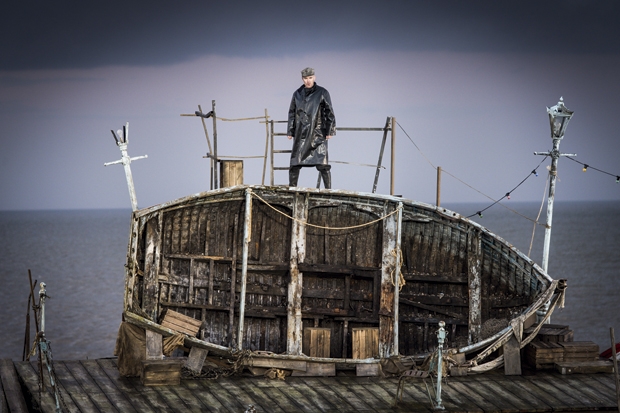With a tidal wave of Peter Grimeses about to engulf us — performances in London, Birmingham and Leeds in September alone — there is also, from 5 September, the film of the celebrated Peter Grimes on Aldeburgh Beach at more than 80 cinemas in the UK. The film was made in June during the three live performances that occasioned ecstatic reviews from all who saw and wrote about them. I didn’t go to any of them, for rather cowardly reasons. But now, having seen the film of the occasion, do I wish I had?
Clearly the atmosphere must have been tremendous: the sound and smell of the sea, the threat of a storm, the being in almost precisely the spot the action takes place and a stone’s throw from where the opera was written — everything inciting a thrilled response. So does this skilfully filmed version add to our understanding and appreciation of a work which, though it is now part of the canon, does not have a settled place in opera lovers’ esteem?
For me, no, though I don’t mean that it wasn’t worth doing, if only as a kind of celebration. I have a strong resistance to films of operas that take place in natural, actual surroundings, whether it’s that terrible film of Carmen, or Felsenstein’s Fidelio.
That most elementary criticism of the operatic form, that people don’t go around singing in ‘real life’, so opera is impossibly artificial, gains some force when you see the ocean (and hear it), the moon, and so on. The set in this production by Tim Albery is a skilful blend of nature and artifice: when you see the whole acting space, it is composed of fishing boats on their side, ladders, wonky lampposts, the kind of thing you might expect in a traditional production. But when, at the end, you see Grimes following Balstrode’s advice and putting out to sea, you inevitably get interested in the wrong things, instead of concentrating on Grimes’s tragedy and the continuing life of the community. There should be this basic instruction to opera set designers: don’t present visually what the composer has represented musically (and to Richard Strauss, unfortunately too late: don’t try to represent musically what the set designer can present effortlessly). The temptation to let rip with the cameras when the orchestra is playing the Sea Interludes must have been almost irresistible, though it was resisted to a praiseworthy degree.
Peter Grimes, depicting as it does the outsider and the society that hounds him, alternates broadly between intimate scenes and ones on a large scale. Not unexpectedly, the crowd scenes fare better in this film than the private ones. The casting of the minor characters is very strong, with Catherine Wyn-Rogers outstanding as Mrs Sedley, and David Kempster a powerful, affecting Balstrode. The apothecary and quack Ned Keene seems to have wandered in from a comic opera, most likely Albert Herring, but the ‘Nieces’, though funny, are also nastily convincing and superbly sung. Giselle Allen sings with enormous expressiveness as Ellen Orford, and her protective behaviour towards the Boy makes for the most moving scenes in the whole work. Since Montagu Slater, the librettist, and Britten collaborated to make Grimes an incoherent character, it is probably a good idea — or the least bad bad idea — for him to be directed in a vague and distant way. The closer you get to him the less intelligible he becomes. Alan Oke in the role is rugged, capped, inscrutable and sings beautifully. His ‘Now the Great Bear and Pleiades’, Britten’s sublime inspiration, is alone worth going to the film for. And all told it is a worthwhile experience, even if, as I still think, misconceived.
The day before I saw the film, my copy of Britten: Essays, Letters and Opera Guides by Hans Keller arrived. It’s emphatically a book that anyone interested in Britten should own and read. Keller was for decades Britten’s most vociferous champion, verbally slaughtering anyone who raised a squeak of an objection, constantly bracketing him with Mozart.
About Grimes and Grimes he had many things to say: I was struck by ‘Other [people] too, he (Grimes) can (sometimes) love as intensely as he can despise them, but he cannot show, let alone prove, his tenderness as easily as his wrath — except through the music which, alas, the people on the stage don’t hear.’ There’s the rub. The music is always and wholly on Grimes’s side, ecstatic, visionary, hardly ever violent: that is mainly saved for the savage crowd. The great opera composers delight as much in the musical creation of a villainous Mime as in a heroic Siegfried. But I am still open to persuasion, and there will be plenty of opportunities for that, not only with Grimes but also at the Proms, with Billy Budd, to be reviewed next week, and then with many of the rest.
Michael Tanner
Do I wish I’d gone to see Peter Grimes on the beach at Aldeburgh? No

issue 07 September 2013







Comments